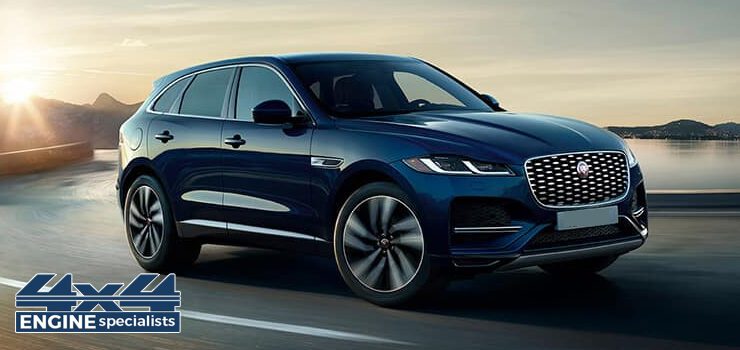If you are looking for a luxury SUV that combines performance, style and comfort, you might want to consider the Jaguar F Pace. This model offers a range of engines to suit different driving needs and preferences. We will explore the features, benefits and drawbacks of each engine option, as well as answer some frequently asked questions.
The Jaguar F Pace is a mid-size crossover SUV that was launched in 2016. It is the first SUV from Jaguar, and it competes with other premium models such as the Audi Q5, BMW X3 and Mercedes-Benz GLC. The F Pace is based on the same platform as the Jaguar XE and XF sedans, and it shares some of their engines and technologies.
Engine Options
The Jaguar F Pace offers four engine options: two petrol and two diesel. Each engine has its own characteristics, advantages and disadvantages. Here is a brief overview of each engine:
2.0L i4 Petrol:
This is the base engine for the F Pace, and it produces 250 horsepower and 365 Nm of torque. It is a turbocharged four-cylinder engine that delivers decent performance and fuel efficiency. It can accelerate from 0 to 100 km/h in 6.8 seconds, and it has a combined fuel consumption of 8.1 L/100 km.
3.0L V6 Petrol:
This is the most powerful engine for the F Pace, and it produces 380 horsepower and 450 Nm of torque. It is a supercharged six-cylinder engine that delivers exhilarating performance and sound. It can accelerate from 0 to 100 km/h in 5.5 seconds, and it has a combined fuel consumption of 10.7 L/100 km.
2.0L i4 Diesel:
This is the most fuel-efficient engine for the F Pace, and it produces 180 horsepower and 430 Nm of torque. It is a turbocharged four-cylinder engine that delivers smooth performance and low emissions. It can accelerate from 0 to 100 km/h in 8.7 seconds, and it has a combined fuel consumption of 5.3 L/100 km.
3.0L V6 Diesel:
This is the most torquey engine for the F Pace, and it produces 300 horsepower and 700 Nm of torque. It is a turbocharged six-cylinder engine that delivers strong performance and towing capacity. It can accelerate from 0 to 100 km/h in 6.2 seconds, and it has a combined fuel consumption of 6.0 L/100 km.
Engine Features
The Jaguar F Pace engines are equipped with various features that enhance their performance, efficiency and reliability. Some of these features are:
Ingenium Technology:
This is a family of engines that are designed and built by Jaguar Land Rover. They are lightweight, compact and modular, which means they can be adapted to different models and configurations. They also use advanced technologies such as variable valve timing, direct injection, twin-scroll turbocharging and stop-start systems to optimize power, torque, fuel economy and emissions.
All-Wheel Drive:
This is a system that distributes power to all four wheels of the vehicle, depending on the driving conditions and mode. It improves traction, stability and handling on different terrains and weather situations. The F Pace also has an Intelligent Driveline Dynamics (IDD) feature that monitors the vehicle’s dynamics and adjusts the torque distribution accordingly.
Adaptive Dynamics:
This is a system that monitors the vehicle’s movements and adjusts the suspension settings accordingly. It enhances comfort, control and agility on different road surfaces and driving styles. The F Pace also has an Adaptive Surface Response (ASR) feature that recognizes different types of surfaces such as snow, ice or gravel and adapts the throttle, steering and braking accordingly.
Configurable Dynamics:
This is a system that allows the driver to customize the vehicle’s performance settings according to their preference. It enables the driver to adjust the throttle response, gear shift speed, steering weight and suspension stiffness using a touchscreen or a rotary dial.
Engine Benefits
The Jaguar F Pace engines offer several benefits for car enthusiasts who value performance, quality and versatility. Some of these benefits are:
Choice:
The F Pace offers four engine options that cater to different driving needs and preferences. Whether you want more power, more efficiency or more torque, you can find an engine that suits you.
Performance:
The F Pace engines deliver impressive performance in terms of acceleration, speed, handling and sound. They are responsive, smooth and refined, which makes driving enjoyable and exciting.
Efficiency:
The F Pace engines are also efficient in terms of fuel consumption, emissions and maintenance. They use advanced technologies that optimize power output while reducing fuel usage and environmental impact.
Reliability:
The F Pace engines are reliable and durable, as they are built with high-quality materials and components. They are also tested and validated under rigorous conditions to ensure they meet the highest standards of safety and performance.
Engine Drawbacks
The Jaguar F Pace engines also have some drawbacks that car enthusiasts should be aware of before buying. Some of these drawbacks are:
Cost:
The F Pace engines are expensive to buy and run, as they are premium products that require premium fuel and service. The higher-end engines also have higher taxes and insurance rates, which add to the ownership cost.
Availability:
The F Pace engines are not widely available in some markets, as they are subject to different regulations and demand. Some engines may have limited supply or long waiting times, which can be frustrating for buyers.
Compatibility:
The F Pace engines are not compatible with some features or accessories that may be desired by some buyers. For example, the 3.0L V6 petrol engine is not compatible with the panoramic roof, the 2.0L i4 diesel engine is not compatible with the sport exhaust, and none of the engines are compatible with the tow bar.
FAQs
Here are some frequently asked questions about the Jaguar F Pace engines:
Which engine is the best for the F Pace?
There is no definitive answer to this question, as it depends on your personal preference, budget and driving style. However, some general guidelines are:
If you want the most powerful and thrilling engine, go for the 3.0L V6 petrol.
If you want the most fuel-efficient and eco-friendly engine, go for the 2.0L i4 diesel.
If you want the most torquey and capable engine, go for the 3.0L V6 diesel.
If you want a balanced and versatile engine, go for the 2.0L i4 petrol.
How often do I need to service the F Pace engines?
The F Pace engines have a service interval of one year or 16,000 km, whichever comes first. You should follow the recommended service schedule and use only authorized dealers and parts to ensure the optimal performance and longevity of your engine.
How do I know which engine is in my F Pace?
You can identify your engine by looking at the badge on the rear of your vehicle. The badge will have a letter and a number that indicate the type and size of your engine. For example:
P250: 2.0L i4 petrol with 250 horsepower
S380: 3.0L V6 petrol with 380 horsepower
D180: 2.0L i4 diesel with 180 horsepower
D300: 3.0L V6 diesel with 300 horsepower


